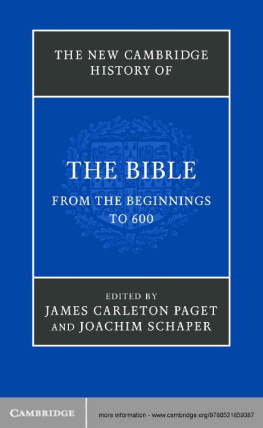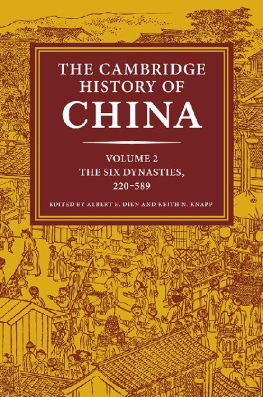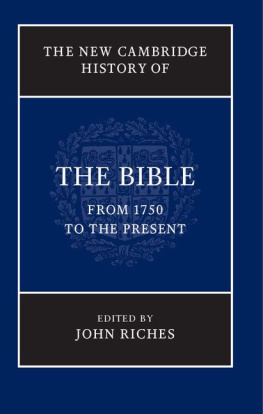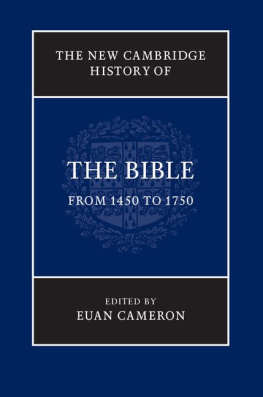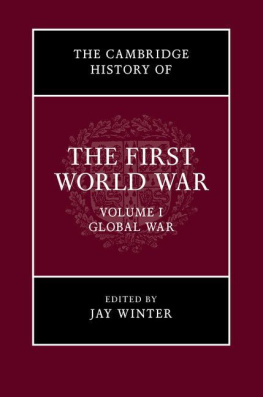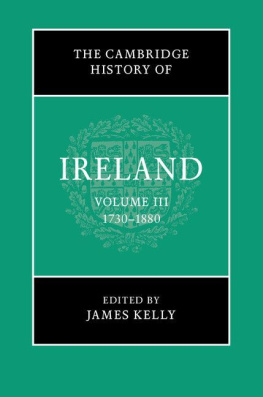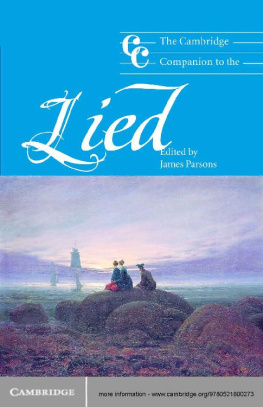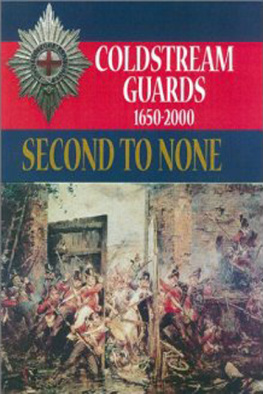The New Cambridge History of The Bible
Recent years have witnessed significant discoveries of texts and artefacts relevant to the study of the Old and New Testaments, and remarkable shifts in scholarly methods of study. The present volume mirrors the increasing specialisation of Old Testament studies, including the Hebrew and Greek Bibles, and reflects rich research activity that has unfolded over the last four decades in Pentateuch theory, Septuagint scholarship, Qumran studies and early Jewish exegesis of biblical texts. The second half of the volume discusses the period running from the New Testament to 600, including chapters on the Coptic, Syriac and Latin Bibles, the Gnostic use of the scriptures, pagan engagement with the Bible, the use of the Bible in Christian councils, and in popular and non-literary culture. A fascinating in-depth account of the reception of the Bible in the earliest period of its history.
James Carleton Paget is Senior Lecturer in New Testament Studies at the University of Cambridge, and Fellow and Tutor at Peterhouse. He is the author of The Epistle of Barnabas (1994) and of Jews, Christians and Jewish Christians in Antiquity (2010).
Joachim Schaper is Professor of Hebrew and Semitic Languages at the University of Aberdeen. He is the author of Eschatology in the Greek Psalter (1995), Priester und Leviten im achmenidischen Juda (2000) and Wie der Hirsch lechzt nach frischem Wasser (2004), and editor of Die Textualisierung der Religion (2009).
The New Cambridge History of The Bible
The New Cambridge History of the Bible series comprises four vol-umes which take into account the considerable advances in scholarship made in almost all biblical disciplines during the previous forty years. The volumes respond to shifts in scholarly methods of study of the Old and New Testaments, look closely at specialised forms of interpretation and address the new concerns of the twenty-first century. Attention is paid to biblical studies in eastern Christian, Jewish and Islamic contexts, rendering the series of interest to students of all Abrahamic faiths. The entire New Cambridge History of the Bible offers a comprehensive account of the development of the Bible from its beginnings to the present day, but each volume can also be read independently, providing a substantial contribution to the scholarship of the period it covers. The New History will provide an invaluable resource for scholars, researchers and students alike.
List of volumes:
James Carleton Paget
and
Joachim Schaper
Volume 1: From the Beginnings to 600
Richard Marsden
and
E. Ann Matter
Volume 2: From 600 to 1450
Euan Cameron
Volume 3: From 1450 to 1750
John Riches
Volume 4: From 1750 to the Present
The New Cambridge History of The Bible
From the Beginnings to 600
Volume 1
Edited by
James Carleton Paget
Joachim Schaper
CAMBRIDGE UNIVERSITY PRESS
Cambridge, New York, Melbourne, Madrid, Cape Town, Singapore, So Paulo, Delhi, Mexico City
Cambridge University Press
The Edinburgh Building, Cambridge CB2 8RU, UK
Published in the United States of America by Cambridge University Press, New York
www.cambridge.org
Information on this title: www.cambridge.org/9780521859387
Cambridge University Press 2013
This publication is in copyright. Subject to statutory exception and to the provisions of relevant collective licensing agreements, no reproduction of any part may take place without the written permission of Cambridge University Press.
First published 2013
Printed and bound in the United Kingdom by the MPG Books Group
A catalogue record for this publication is available from the British Library
isbn 978-0-521-85938-7 Hardback
Cambridge University Press has no responsibility for the persistence or accuracy of URLs for external or third-party internet websites referred to in this publication, and does not guarantee that any content on such websites is, or will remain, accurate or appropriate.
Contents
Geoffrey Khan
Jan Joosten
William M. Schniedewind
Larry W. Hurtado and Chris Keith
Eugene Ulrich
Joachim Schaper
John Barton
John J. Collins
Gnter Stemberger
C. T. R. Hayward
Jonathan G. Campbell
Kristin De Troyer
William Horbury
C. T. R. Hayward
James W. Watts
Emanuel Tov
Joseph Verheyden
David C. Parker
J. K. Elliott
Dale C. Allison, Jr.
Pierre-Maurice Bogaert
Peter J. Williams
Wolf-Peter Funk
James Carleton Paget
Winrich Lhr
Gilles Dorival
Michael J. Hollerich
Adam Kamesar
Carol Harrison
J. F. Coakley
Mark Edwards
Frances M. Young
Wolfram Kinzig
Mark W. Elliott
Thomas Graumann
Gerard Rouwhorst
Lucy Grig
Figures
List of contributors
Dale C. Allison
Jr Pittsburgh Theological Seminary
John Barton
University of Oxford
Pierre-Maurice Bogaert
Universit catholique de Louvain
Jonathan G. Campbell
University of Bristol
James Carleton Paget
University of Cambridge
J. F. Coakley
Faculty of Divinity and University Library, University of Cambridge
John J. Collins
Yale University
Kristin De Troyer
University of St Andrews
Gilles Dorival
Universit dAix-Marseille, Institut universitaire de France
Mark Edwards
Christ Church, Oxford
J. K. Elliott
University of Leeds
Mark W. Elliott
University of St Andrews
Wolf-Peter Funk
Universit Laval, Quebec
Thomas Graumann
University of Cambridge
Lucy Grig
University of Edinburgh
Carol Harrison
Department of Theology and Religion, University of Durham
C. T. R. Hayward
University of Durham
Michael J. Hollerich
University of St Thomas, St Paul, Minnesota
William Horbury
Corpus Christi College, Cambridge
Larry W. Hurtado
New College, University of Edinburgh
Jan Joosten
Facult de thologie protestante, Universit de Strasbourg
Adam Kamesar
Hebrew Union College, Cincinnati
Chris Keith
St Mary's University College, Twickenham
Geoffrey Khan
University of Cambridge
Wolfram Kinzig
Faculty of Evangelical Theology, University of Bonn
Winrich Lhr
Theology Faculty, University of Heidelberg
David C. Parker
University of Birmingham
Gerard Rouwhorst
Tilburg School of Catholic Theology, University of Tilburg
Joachim Schaper
School of Divinity, History and Philosophy, University of Aberdeen
William M. Schniedewind
UCLA
Gnter Stemberger
University of Vienna
Emanuel Tov
Hebrew University, Jerusalem

